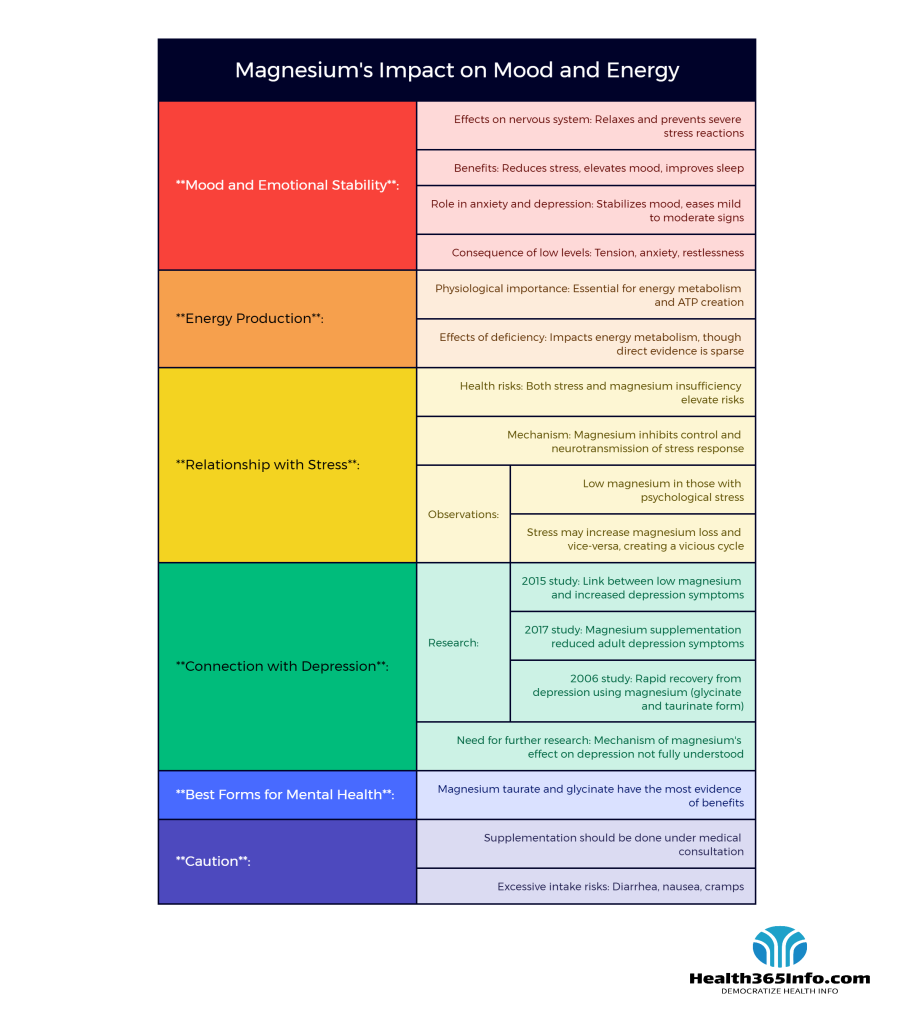
It is well known that magnesium affects mood and energy levels. Keeping your magnesium levels in check might provide you more energy and emotional stability. Additionally, it has a relaxing impact on the nervous system, which helps prevent severe stress reactions. According to research, getting enough magnesium can reduce stress, elevate mood, and improve sleep. Magnesium supplements have been demonstrated to stabilize mood and ease the signs of mild to moderate anxiety and depression. Your mood may be impacted by low magnesium levels, resulting in tension, anxiety, and restlessness.
Magnesium is a necessary mineral that is important for several physiological processes, including the creation of energy. It is well recognized that magnesium is essential for energy metabolism and the creation of adenosine triphosphate (ATP), the body’s main source of energy. Research suggests that low magnesium levels or a poor diet may have an impact on energy metabolism, despite the fact that there is little direct evidence linking magnesium to enhanced energy levels.
Stress and magnesium insufficiency are two circumstances that frequently raise health hazards. According to studies, magnesium inhibits the normal stress response’s control and neurotransmission. There have been reports of low magnesium levels in those who have psychological stress or its manifestations. According to this, stress may increase magnesium loss, resulting in a shortfall, and a magnesium deficiency may make the body more susceptible to stress, establishing a vicious cycle between magnesium and stress.
There is research that support a connection between low magnesium levels and depression.
Low magnesium levels have been linked to an increase in depression symptoms in a number of different age groups and ethnic populations, according to a 2015 study. Taking magnesium supplements reduced the symptoms of adult depression, according to a 2017 study.
A 2006 study titled “Rapid recovery from major depression using magnesium treatment” provided case studies demonstrating quick recovery from major depression using 125–300 mg of magnesium (in the form of glycinate and taurinate) after each meal and before bed.
Understanding the mechanism of magnesium’s potential impact on depression will require more study.
According to available information, magnesium taurate and glycinate have the most studies proving their benefits for treating anxiety and other mental health issues.
It’s crucial to remember that taking magnesium supplements shouldn’t be done without consulting a doctor because large doses of the supplement may cause some people to experience diarrhea, nausea, and cramps.

KEY References
Wienecke, E., & Nolden, C. (2016, December 1). Langzeit-HRV-Analyse zeigt Stressreduktion durch Magnesiumzufuhr. Mmw-fortschritte Der Medizin; Springer Science+Business Media. https://doi.org/10.1007/s15006-016-9054-7
Uwitonze, A. M., & Razzaque, M. S. (2018, March 1). Role of Magnesium in Vitamin D Activation and Function. The Journal of the American Osteopathic Association; American Osteopathic Association. https://doi.org/10.7556/jaoa.2018.037
The effect of magnesium supplementation on primary insomnia in elderly: A double-blind placebo-controlled clinical trial. (2012, December 1). PubMed. https://pubmed.ncbi.nlm.nih.gov/23853635/
Pickering, G., Mazur, A., Trousselard, M., Bieńkowski, P., Yaltsewa, N., Amessou, M., Noah, L., & Pouteau, E. (2020, November 28). Magnesium Status and Stress: The Vicious Circle Concept Revisited. Nutrients; Multidisciplinary Digital Publishing Institute. https://doi.org/10.3390/nu12123672
Brown, V. (2022, January 7). Magnesium—a supplement for treating depression? Byrdine F. Lewis College of Nursing and Health Professions. https://lewis.gsu.edu/2022/01/04/magnesium-a-supplement-for-treating-depression/
Tarleton, E. K., & Littenberg, B. (2015, March 1). Magnesium Intake and Depression in Adults. Journal of the American Board of Family Medicine; American Board of Family Medicine. https://doi.org/10.3122/jabfm.2015.02.140176
Eby, G. A. (2011). Magnesium and major depression. Magnesium in the Central Nervous System – NCBI Bookshelf. https://www.ncbi.nlm.nih.gov/books/NBK507265/
Tarleton, E. K., Kennedy, A. G., Rose, G. L., Crocker, A., & Littenberg, B. (2019, June 28). The Association between Serum Magnesium Levels and Depression in an Adult Primary Care Population. Nutrients; Multidisciplinary Digital Publishing Institute. https://doi.org/10.3390/nu11071475
Tarleton, E. K., Littenberg, B., MacLean, C. D., Kennedy, A. G., & Daley, C. (2017, June 27). Role of magnesium supplementation in the treatment of depression: A randomized clinical trial. PLOS ONE; Public Library of Science. https://doi.org/10.1371/journal.pone.0180067
MSEd, K. C. (2021, February 19). Will Taking Magnesium Help Your Depression? Verywell Mind. https://www.verywellmind.com/magnesium-for-depression-does-it-help-5112650
Eby, G. A., & Eby, K. L. (2006, January 1). Rapid recovery from major depression using magnesium treatment. Medical Hypotheses; Elsevier BV. https://doi.org/10.1016/j.mehy.2006.01.047
Tarleton, E. K., Kennedy, A. G., Rose, G. L., Crocker, A., & Littenberg, B. (2019, June 28). The Association between Serum Magnesium Levels and Depression in an Adult Primary Care Population. Nutrients; Multidisciplinary Digital Publishing Institute. https://doi.org/10.3390/nu11071475
Ateş, M., Kızıldağ, S., Yüksel, O., Hoşgörler, F., Yüce, Z., Güvendi, G., Kandiş, S., Karakiliç, A., Koç, B., & Uysal, N. (2019, February 13). Dose-Dependent Absorption Profile of Different Magnesium Compounds. Biological Trace Element Research; Springer Science+Business Media. https://doi.org/10.1007/s12011-019-01663-0
Uysal, N., Kızıldağ, S., Yüce, Z., Güvendi, G., Kandiş, S., Koç, B., Karakiliç, A., Çamsari, U. M., & Ateş, M. (2018, April 21). Timeline (Bioavailability) of Magnesium Compounds in Hours: Which Magnesium Compound Works Best? Biological Trace Element Research; Springer Science+Business Media. https://doi.org/10.1007/s12011-018-1351-9
Chandra, S. (2023, August 15). Best Forms of Magnesium for Anxiety and Depression – SURUCHI CHANDRA M.D. SURUCHI CHANDRA M.D. https://chandramd.com/magnesium-supplements-anxiety/
Turner, L., & Turner, L. (2021, September 23). Boost Your Mood and Beat Stress with Magnesium. Clean Eating. https://www.cleaneatingmag.com/clean-diet/general-health/magnesium-for-stress-mood-sleep/
Correction: Subclinical magnesium deficiency: a principal driver of cardiovascular disease and a public health crisis. (2018, April 1). Open Heart; BMJ. https://doi.org/10.1136/openhrt-2017-000668corr1
Blancquaert, L., Vervaet, C., & Derave, W. (2019, July 20). Predicting and Testing Bioavailability of Magnesium Supplements. Nutrients; Multidisciplinary Digital Publishing Institute. https://doi.org/10.3390/nu11071663
Boyle, N. B., Lawton, C., & Dye, L. (2017, April 26). The Effects of Magnesium Supplementation on Subjective Anxiety and Stress—A Systematic Review. Nutrients; Multidisciplinary Digital Publishing Institute. https://doi.org/10.3390/nu9050429













